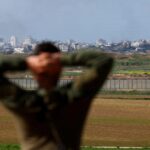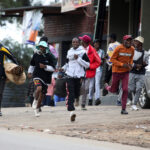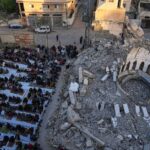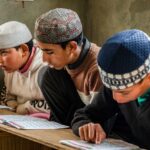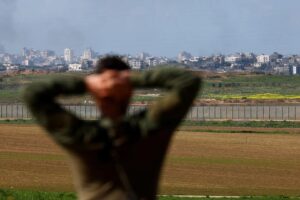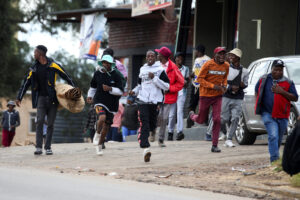Our interview with the President of Senegal, Macky Sall, ran into a few unexpected delays. First, he had a cold; then he held an impromptu reception for the national under-20 football team that had just returned from Egypt, having just been crowned champions of Africa.
In the space of 13 short months, Senegal’s soccer players have won the Africa Cup of Nations, the CAF Beach Soccer Africa Cup, the Champions League, and now the under-20 Africa Cup of Nations. The success on the soccer field has been attributed to minute planning and plenty of effort. Just as for their football teams, these are heady times for Senegal’s 17m people. The country is Africa’s fastest-growing economy. The dynamism of the capital city, Dakar, is palpable and reminiscent of many African capital cities a few years back, at the height of the Africa Rising narrative.
Throughout other meetings and conversations in Senegal, numerous issues were raised. The elections next year did not seem to be the President’s priority – even if the issue of a third mandate will need to be addressed. For now at least, the President wants to focus on the job at hand, even if running for a third mandate is constitutionally allowed. We’ll find out later in the year.
Like most countries today, Senegal is not immune to the rising cost of living. A priority for the country is to produce more of what it consumes. As in many African countries, the youth issue – providing them with jobs and ensuring that they can contribute positively to the economy – is also central. The general consensus among those we spoke to was that Senegal was on a positive path of growth and transformation. It is definitely one of the brighter lights in Africa.
Senegal is also systemically important to the region. It is an important actor in Francophone Africa, alongside Niger and Côte d’Ivoire. Diplomatically, militarily and politically it provides stability.
Many countries in the Sahel, as the President acknowledges in this interview, are in a precarious state. The success of a country like Senegal is critical in providing hope not just for the country’s youth but regionally. Double-digit growth rates will help raise the tide for all. As it seeks to become a regional industrial hub, Senegal can become a driver of economic growth for all its neighbours.

Much noise has been made about the recent oil and gas finds. Senegal is expected to be Africa’s fastest-growing economy over the next two years at least; it is easy to assume that this is due to these discoveries. But revenues from the new fields will start trickling in at the end of this year at the earliest, and even then the proceeds will at first go to pay off the massive investments needed to develop the fields.
Growth is in fact more diversified. Foreign direct investment is a contributing factor, but more important has been the massive investment in infrastructure, a rising middle class and a growing private sector. Some of these projects can be credited to Macky Sall’s predecessor, Abdoulaye Wade.
President Sall is emphatic that the private sector will have to play a much bigger role, and that is what the current administration is trying to achieve – to create a conducive environment and promote some key sectors, especially agriculture and local industry.
As he tells us in this interview, the state has an outsized role in that emerging phase. This is why Sall called for a review of how the global financial architecture works. It is currently skewed in favour of the richer countries, which can effectively print money. When a shock, or multiple external shocks, take place – as we have seen with Covid and the conflict in Ukraine – smaller countries are hamstrung.
Sall has had a busy year following his time as Chair of the African Union. In July 2022 he went to see Russian president Vladimir Putin to present Africa’s position, given the continent’s greater susceptibility to disruptions in the supply of fertilisers and grains. He was also particularly vocal on the issue of international credit rating agencies unfairly penalising the continent and countries such as his.
He has said that the global finance architecture is not fit for purpose, especially when it comes to emerging markets and Africa having a seat at the decision-making table. However, he thinks that progress has been made across all these issues. He acknowledges the support of many, including French president Emmanuel Macron, who he sees as often being first to support African initiatives in the global arena.
With regard to the future of his country, he is cautiously upbeat. The oil and gas industry can be the trigger for a whole ecosystem of new industries and jobs – even if, in the short term, it will not provide a windfall for the state. Following his year as Chair of the African Union, Sall also believes that Africa must be more aware of itself and its possibilities.
African Business: The current global context is challenging. If Senegal seems to be doing well, what are the challenges that you see as the most pressing?
Macky Sall: In Africa, we are experiencing a challenge: to revitalise the economies due to a lack of capacity since the mechanisms we advocated for are yet to be implemented. These mechanisms included, for example, a reallocation of SDRs [Special Drawing Rights] to replenish our economies and stimulate sectors.
Over the past year, both oil and food prices have risen. This fuels inflation in all countries and governments have been forced to subsidise [essential goods], leading to a loss of revenue and greater deficits.
Despite this unfavourable environment, Senegal has quickly resumed its pre-crisis growth targets. From 1.5% in 2020, growth reached 6% in 2022, and we are expecting 10% in 2023.
We expect our oil and gas investments to come on-stream in the fourth quarter of this year, and this is in addition to our efforts to intensify activity in agriculture and industry.
Indeed, the World Bank predicts that Senegal will be the best-performing economy in Africa in 2023 and 2024. Does this mean more infrastructure and investment for your government?
First of all, it simply means that the economy will be robust. It will generate more income and, naturally, more investment. We must avoid falling into a trap of thinking that these new oil and gas discoveries will transform our fortunes overnight. We need to continue working as we have always done.
These new resources will strengthen the productive and social sectors. By productive sectors, I refer, in particular, to agriculture and animal husbandry, which we must modernise and intensify. I also mention fishing; we must strengthen aquaculture and forestry. Of course, continuously, we must also work to enhance social safety nets.
The oil resources will not be as significant as you suggest during the first four or five years. During this period, the share going to the state will not be substantial because most of the original investments need to be repaid.
The most important aspect of the oil find is the business activity that it brings to the country, especially in terms of the services sector. This will then benefit other sectors too.
In terms of the oil resources we have a framework in place, voted in by parliament, that will safeguard it – avoiding mistakes made in the past by other countries. A certain percentage will be allocated to FONSIS [the sovereign wealth fund] and we will not be able to mortgage future earnings for current spending needs.
In other areas, we are enhancing our ports and logistics facilities, because the country cannot rely on a mono-industry but needs to succeed because of the whole ecosystem.
You mentioned SDRs. Are you asking for more aid from G20 countries and international organisations for African countries?
I would not say more aid, but more positive partnerships. This is what we say to our partners in the North: during the Covid crisis, they were able to develop, on their own, mechanisms to cushion the shock, which is commendable. These resilience schemes were financed with hundreds of billions of dollars or euros. But the economies of the South cannot do this because our central banks do not have the same resources.
SDRs were mobilised, but even then sub-Saharan Africa’s share was $23bn of a total of $650bn. Senegal received $450m. It’s something, but very little given our needs.
There is talk of a new allocation of SDRs to the tune of $100bn, to all developing countries, not just Africa. Using leverage, this could potentially unlock $400bn at low interest rates, around 0.5%.
This would give countries the resources to really breathe and get things moving again. Several large countries had committed themselves to this, notably the Europeans and China, but this is now stuck in the American Congress.
Progress on these issues is too slow. We continue to plead to the world to give us the tools to re-energise our economies. It would be good for all of humanity. And this is our state of mind today in Africa: to build win-win partnerships based on mutual interests.
There is a lot of talk of African sovereign funds having over-borrowed. Are you comfortable with your current budget deficit and debt levels?
We follow the WAEMU [West African Economic and Monetary Union] convergence criteria: debt must be less than 70% of GDP – which seems low when the big countries have passed the 100% debt mark. My wish is to raise this debt ceiling within the Union. Why not to 90% of GDP? This would give more budgetary space.
Our level of development is such that the state does everything, and provides many public goods: water, electricity… We cannot have such a scheme and put a cap on the indebtedness of states.
As regards the budget, the framework provides for a 3% deficit, which again gives very little room for manoeuvre to finance social innovations, schools, universities and roads – not to mention defence and security. My opinion is that this stringent framework is too much to ask from our countries.
Following the Covid crisis, we are discussing all these debt-related metrics: should Africa respect the Maastricht criteria decided by the European Union at the time of the euro’s creation? Should the German deficit at the time [following reunification] become a global standard?
Even if we have to control deficits, I am not against certain flexibility, particularly in terms of debt.
This brings us to financing for development: what resources and what mechanisms [do we have at our disposal]? I have also engaged in a lot of discussions with the OECD on the need to reform the rules [and non-tariff barriers] to allow greater trade between the North and the South.
We need to obtain longer maturities on export credits, with less expensive guarantees; this raises the rating issue because it depends on the perception of risk and, therefore, the value of the requested insurance. Everything is connected! This is a dialogue that we must have, always in the spirit of a win-win partnership. We all have something to gain from this OECD reform, so that our countries can access longer terms with fewer guarantees.
But aren’t you concerned about the debt levels of some other African countries? Many are at the edge of the precipice…
Some debt levels are indeed high with regard to the targets we just mentioned. And some countries are having issues servicing their debts. They need to be supported. It is the IMF’s mission to deal with this kind of crisis, which can happen to any country; we must support them and help them to carry out the necessary reforms, but I do not see how a country can develop without taking on debt.
Of course, we must control that debt, which must be used wisely, for productive investments, and not to cover operational costs. I believe that, overall, the amount of African debt can be described as appropriate. It is not excessive.
You say that the public sector plays an oversized role in Senegal…
Everywhere in Africa – it is not specific to Senegal. Due to the state of development, we have yet to reach a level where the private sector can take over.
Some European countries have gone a year without a recognised government. In Africa, this is unthinkable. The state essentially oversees the biggest infrastructure projects and pays a large proportion of salaries; and many of the larger contracts are also those of the state. The private sector can take over but only once we have built the basic infrastructure – roads, railroads and ports.
When you compare the Senegal of 2012 to the Senegal of today, how do you see its development?
In all objectivity, it’s beyond comparison, whatever metric you want to compare. In terms of economic capacity, the economy and [government] budgets have tripled, from 2,400bn CFA francs ($4bn) to 6,500bn CFA francs ($11bn) in ten years.
Regarding infrastructure, it is incomparable. Look at what we have built in terms of highways, roads, and universities; in agriculture, production has been multiplied by two, sometimes by three for certain crops. The economy is much more powerful, and we have progressed in all sectors, including water and electricity.
We have made progress; but there is still much more to achieve the objectives we have set ourselves. We still have plenty of development work ahead of us.
As Chair of the African Union, you tried to address several issues, including the food crisis in relation to fertilisers and the import of grains. Have you seen any progress since the outbreak of the war in Ukraine?
We obtained some favourable developments. I went to Sochi in June 2022 to report on these concerns – and in July agreements with the United Nations, Turkey, Russia and Ukraine have allowed the export of grain from the Black Sea, and we have seen some order restored to the international market.
Since December, we have been developing a common strategy to import from the United States, a country that has seven years’ worth of [grain] reserves. It can therefore supply the market to avoid price hikes driven by speculators. Gradually, the obstacles that hindered maritime trade have been lifted.
In 2023, we will have fewer problems at this level; and already, prices have fallen compared to 2022, so we can move forward. In addition, we are working with the European Union, France, and Germany to facilitate trade. These are all efforts to find alternatives, in the short term, in the grain and fertiliser markets.
In the medium term, it is a matter of developing African agriculture capabilities so that we are food secure. At the Dakar 2 summit on food security that we hosted with the African Development Bank in January, the AfDB was able to mobilise more than $36bn in investments in agricultural programmes for the next five years. This is something very fundamental and very new to give Africa the capacity to ensure its food self-sufficiency.
So you are confident in the capacities of the agricultural sector in Senegal?
Yes, it is already changing. Mechanisation and the use of technology is on the rise. Our objective of food sovereignty means that we are reinjecting resources into our agricultural program, amounting to 1,600bn CFA francs ($2.6bn) over three years. We have never invested so much in agriculture. This translates into more land being cultivated, greater mechanisation, better use of seeds, more fertilisers. In short, more productivity and production, not to mention our efforts to move up the value chain: processing and marketing.
This logic is more or less the same everywhere in Africa. Depending on the agro-ecological context, everyone is aware that we can only move forward with agriculture and agricultural processing.
Senegal operates in a somewhat turbulent neighbourhood, with an increasingly fragile Sahel. How do you deal with this?
As Africans, we favour wisdom in our actions. And wisdom requires that the neighbourhood be treated with significant consideration. As chair of the African Union, I visited Mali and Chad, two countries in transition.
As far as possible, we are trying to accomplish these transitions in conformity with regional and sub-regional institutions. These African countries aren’t going anywhere, and they need our support and understanding. Ultimately, [a positive outcome] depends on them – but I am in favour of accompanying these transitions so that they come to a successful conclusion.
Do you fear the spread of jihadism?
Terrorism spares no country. Admittedly, we have suffered very few actions in Senegal, but we should not rest on our laurels. The spread is unavoidable, insofar as jihadism operates within a cultural, religious, and social continuum. We work daily to control our environment and territory.
Does the continent seem united in its objectives? It appears to be more fragmented than in past times…
Africa has a great awareness of itself, of what it represents and of what it wants to be. All this is clear in the heads of the leaders and the heads of Africans, whatever the level of representation. We had the will to speak with one voice. This was the case before my presidency, and it will still be valid after.
We also realise that we must work more together on African issues and conflicts, to elaborate solutions. Of course, Africa is vast: 30m square kilometres, more than China, the United States and the EU combined. The continent is diverse, from Arab Africa to Southern Africa… there is a lot of cultural, ethnic, and religious diversity and political systems too. Added to this are the colonial legacies. All this has to be made coherent. Therefore, Africans should be proud of the efforts undertaken to preserve this joint organisation called the African Union, that tries, despite the crises and tensions, to carry the voice of Africa on the essential questions.
That is why we must pay attention to what we are doing. We must refuse the view that Africa is doing nothing, that Africa is not moving forward, that there are too many problems in Africa. This view does not correspond to reality.
If you aggregate the efforts being made in each African country, you will see that much work is being done on the continent today, including work on infrastructure, universities, investments… Africans must have confidence in themselves, their leaders and their actions; it is up to them to build their continent.
On their side, Western countries, China and Russia are putting pressure on African countries to take sides in their divisions. How should African leaders react?
The world is in a permanent state of competition, so it is normal that everyone tries to have more influence. It is up to Africans to make choices. In Senegal, we partner with everyone. We have traditional friendships with the Western bloc. I have always assumed that.
Since independence, we have maintained diplomacy based on shared values and opened our horizons. That is why we are open to China and the rest of Asia, Russia, Turkey – without denying our old friendships with the Western bloc.
But, of course, we try to make the most of our partnerships in this challenging world. We do not enter into a Manichean logic of blocs against blocs. In this global kaleidoscope, Africa must play its role; the continent has weight and resources and must count in the concert of nations. We wish to make this contribution without being in the wake of any particular group.
You are deemed close to French President Emmanuel Macron. But the African street, the African youth, seem to be increasingly suspicious of France. Is it wrong?
Let’s tell it like it is: in African struggles, President Macron has always been on our side and has often been among the first leaders to speak out for Africa. Another matter is whether the African street, the youth, has a different perception.
The reality is, as I have described to you with the process of the African Union entering the G20 and on other issues such as vaccines and the reform of the UN Security Council: we are working closely and responsibly with President Macron without being subservient to him. If we disagree, we express it very clearly. The French President supports Africa’s progress; I experience this daily in my dealings with him.
To conclude, let’s go back to my first question: the significant challenges facing Senegal in the coming years. What are they: reducing inequalities, training young people, or investing in infrastructure? I will first mention the issue of demography, which we must control. Then we must give a perspective to youth regarding employability, which implies providing training. This means changing the paradigms of the education system. Given the massive number coming on to the job market each year, the current system cannot function or provide employment opportunities for young people.
Therefore we need to develop vocational training further, and orient ourselves even more towards the professions of the future, those of the digital economy, coding, science, technical skills and innovation. These new-economy jobs will allow us to create many jobs. Then, to absorb these flows, we must develop the infrastructure, roads, and schools and continue the construction efforts. This requires vast resources.
And we must develop the concept of entrepreneurship, so that everyone is trained to develop their activity. We can help them with financing and accompany them, rather than making them believe that the state can provide work to everyone. The state will do its part, but alternatives are needed. These will come from the private sector, which must be developed; that is why we want an open economy. And there are also important sectors such as modernised agriculture and livestock. The significant challenge is centred around creating these jobs.
Source : AfricanBusiness


